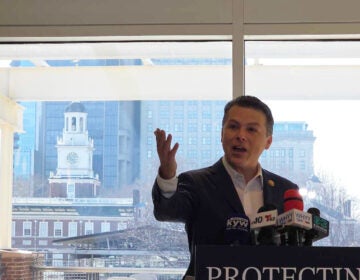No regrets, Chelsea Manning tells Penn audience
Seven years ago, newspapers around the country published details of the explosive cables released by WikiLeaks after Chelsea Manning provided the trove of U.S. Army documents.

Chelsea Manning is pictured in Philadelphia in this 2017 file photo. (Annenberg School for Communication, University of Pennsylvania, file)
Former Army intelligence analyst Chelsea Manning has no misgivings about being the force behind what’s been called one of the most notorious leaks of classified documents in U.S. history.
“I don’t have any regrets. You can’t go back in time and change things,” said Manning Wednesday night, speaking to a packed room at the Annenberg Center’s Zellerbach Theatre on the campus of the University of Pennsylvania. “I made the decision to do what I did, so that’s it.”
Manning’s somewhat laid-back response fails to capture the magnitude of the hundreds of thousands of diplomatic cables from U.S. embassies and consulates around the world laying bare military strategies, conversations on climate change and efforts at disarming nuclear threats, among other state secrets. Almost exactly seven years ago, major newspapers around the country published details of the explosive cables released by WikiLeaks after Manning provided the trove of documents to the anti-secrecy organization.
In 2013, Manning, who is transgender, was convicted of espionage and sentenced to 35 years in prison when she was known as Bradley Manning. President Barack Obama commuted her sentence in the waning days of his term, but during seven years in prison, Manning grappled with depression and tried to commit suicide twice. While incarcerated, she also began a gender transition.
This rocky time came despite an overwhelming outpouring from supporters, Manning told the audience on Wednesday.
“I got over 200,000 letters and cards,” said Manning. She also began to write newspaper columns for the Guardian newspaper, dictating them to editors over a prison phone.
“Finishing them required a very patient editor,” she said.
She composed her editorials when she wasn’t studying up on legal cases in the prison’s law library, or spending time in the prison’s wood shop.
“I learned a lot about wood that I didn’t know,” said Manning, who said she made flag boxes and other decorative items as an inmate at Fort Leavenworth.
Manning’s stop in Philadelphia was not part of a speaking tour, but since she was released from prison in May, she has given a number of interviews about the cable leaks and her time behind bars.
The 29-year-old is now living in Bethesda, Maryland and working on a book and a documentary about her life. A representative for Manning said she is not granting interviews to the press until the release of her documentary, XY Chelsea, which is currently in production.
‘We are who we say we are’
In a wide-ranging conversation moderated by McGill University anthropologist Gabriella Coleman, Manning devoted an hour to discussing topics that veered dramatically from diplomatic cables. She talked about engaging with internet trolls (“I kind of like it”), her views on media (“The media has an interest in portraying things in a rosy light”), and the ongoing debate about net neutrality (“It should be taken out of the hands of the FCC and put into the public’s hands”).
Manning became most animated when Coleman asked about the brouhaha that erupted over a Canadian professor’s refusal to use gender-neutral pronouns, saying it impinged on his free-speech rights.
“It’s all about him, isn’t it?” said Manning to audience laughter. She then shifted to a sterner tone.
“We are who we say we are. It’s as simple as that. This isn’t a free-speech issue. It’s a dignity issue. It doesn’t hurt him, just use it,” she said. “It’s hurtful to be on the other end of that and not be acknowledged or validated.”
It was a characteristically impassioned response from someone who emerged from a military prison as a national voice for gay and transgender rights. That’s on top of continuing to agitate for the exposure of government secrets, a legacy that she will never be able to shake. And she’s fine with that.
“These are our institutions. And what’s their intent? To keep the public unaware of things — given the scale of the classification system — and to crush dissent,” Manning said. “This is not just about secrecy but about whether we have an open dialogue in our society.”
In the months after she passed off the hundreds of thousands of documents to WikiLeaks, the repercussions were enormous. U.S. ambassadors to Mexico and Libya were brought down. The cables are credited with helping inspire an uprising in Tunisia, according to the New York Times.
And among the cables was a video showing a U.S. Apache helicopter attack in Baghdad that killed a dozen people, including two news staffers for Reuters. The footage cast doubt on the Pentagon’s official story about the deadly incident and prompted calls for a fuller investigation into the bombing. The cables, as the Guardian wrote, offered a view of war that was counter to the “tidied up and sanitized ‘public’ war’ as glimpsed through official communiqués.”
Hero or traitor?
Some portray Manning as a heroic whistleblower; others call her a traitor who betrayed her country. The debate continues to rage seven years she released the government secrets, as experts and academics continue to assess the complete impact of the disclosure.
Her opinion now of the whistleblower outlet that initiated the public deabte about Manning’s actions?
“WikiLeaks? I don’t get into that discussion,” Manning said. “I’m more focused on me now. A lot has happened in seven years, and I’m still trying to figure it all out.”
One thing she was quickly to put to rest? A blog-propagated theory that has made her chuckle.
“Some blogs are saying I’m getting health care through the military, but my Kaiser Permanente bills say something very differently,” she said.
An audience member, in one of the final questions, wondered if Manning noticed as an intelligence analyst any difference in wartime strategies between Democratic and Republic administrations.
“If you take the Bush-era policies, and slide them over to the Obama administration, things didn’t change very much, there was just more paperwork and more checks and balances,” Manning said.
Democratic leadership during war, she said, was focused more on law and process, whereas Republican leaders gave more attention and energy to accomplishing goals through shows of strength.
“Regardless of whether or not they have a ‘D’ or ‘R’ before their name, they always want more and more,” she said of military might. “They just frame it differently.”
Although, she mused, perhaps there is another distinction between the political parties.
“A ‘D’ is more likely to say, ‘We need more trans drone pilots.’ ”
WHYY is your source for fact-based, in-depth journalism and information. As a nonprofit organization, we rely on financial support from readers like you. Please give today.




